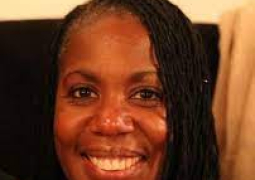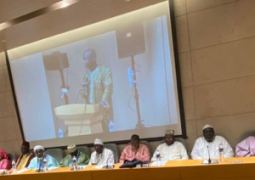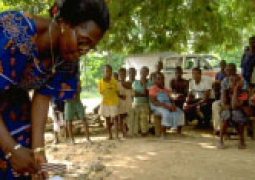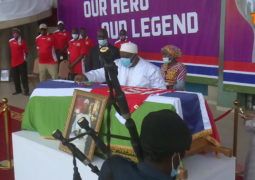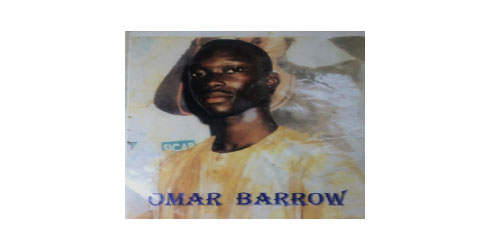
The late Omar was a presenter and host at Sud FM radio. He also worked as a Red Cross volunteer. The young Mr. Barrow was delivering humanitarian aid to casualties of the April 10 student demonstration when a soldier’s bullet cut him down. Until testimonies began at the TRRC, mystery surrounding his death was never unraveled. However, his widow last month confirmed receipt of D96,000 as part reparation for their loss.
Omar was the bread winner of his family. He worked to support his parents and siblings. From feeding to education and other needs. He was a hardworking, respected member of LatriKunda, where his marriage to Awa Sanneh was well celebrated. The young couple were truly in love and the coming of their first daughter, Fatou, was even celebrated more. In fact, Fatou had two naming ceremonies – one from her dad’s family and another at her mum’s. It was so unfortunate that the daughter would never meet her dad again five months down the line. She would grow up hearing stories of his father’s times and work as a journalist and a Red Cross volunteer.
“I do not really know my dad but I learned he was a good person who was devoted to helping people. He was a good journalist too and a good listener to people,” said late Omar Barrow’s 22-year-old daughter, now pursuing journalism like her dad, at the University of The Gambia.
She takes special pride in what her father did in his lifetime. Fatou used her father’s legacy as bench mark for her own values: to serve humanity through journalism. The trouble was, without her dad, she had grown up to face life’s challenges by relying on her mum, who picked up a job after Omar’s loss to fend for her daughter and herself. As a woman, she would bring up her daughter just as Omar would have wanted. She instills the values of patience, hard work and discipline in her daughter. Notwithstanding her efforts, Fatou still struggles with her education at the University. The fees are too high for her mum to bear alone, and at one point, she had to differ her studies due to payment.
“I want to continue my father’s legacy. I want to be a good journalist like him. He died a hero as he was killed in the Red Cross building working as a volunteer. I believe he was killed because he was targeted for witnessing crimes on that day… we all know that bullets are not supposed to enter Red Cross facilities,” she said.
Omar was just 25 and his siblings were younger and all dependent on him, on top of their parents. His widow, Awa, was just 22 when he was killed. Omar’s death had really touched her life in ways that her daughter Fatou described as traumatising. “You being 22 and losing your husband was a hard experience. Especially leaving you with a five months’ old baby when none of your family members was strong enough to support you. So she had to start working to look after me even before her grieve subsides,” Fatou explained.
When TRRC learned about Omar’s only surviving daughter was struggling with her university fee, they offered a bailout for her school arrears and last month, her mum was called to receive a D96,000 as a part reparation for Omar’s family.
“The money was never enough to take care of us,” Barrow’s widow said. “However, it would help fix very important needs of the family. But there’s no amount of money equivalent to a loss of a husband and dad. We were promised D600,000 but we only received D96,000,” she said.
The widow of Omar happens to be the face of a large group of dependents who have all suffered the loss of Omar: his siblings, parents and immediate family. Now, they are thinking how to share this money among themselves as they are all considered Omar’s family.
It was for such reasons that another slain, more senior journalist’s family, Deyda Hydara, did not opt to receive the reparation package offered by the TRRC. The Hydara family wrote to TRRC and said reparation funds meant for them should be instead distributed among more deserving victims who are in urgent need of assistance, their father having won several posthumous awards, some of which came with monetary compensation.
The Gambia Press Union President, Sheriff Bojang Jnr., said, “The GPU hasn’t been officially approached yet for any sort of discussion about any payment of reparation to any journalist.”
In July 2019, the Gambia Press Union (GPU) expressed “shock but relieve” after a military personnel confessed to taking part in the killing of veteran journalist Deyda Hydara. The witness revealed to the TRRC how the late Deyda Hydara was gunned down on the alleged instruction of former president Yahya Jammeh.
Meanwhile, Mariam Hydara, widow of the late Deyda Hydara, thought it best not to receive the sum awarded to his family. Instead, she wrote to them requesting that their share of the sum be disbursed to other families who needed it the most, in Deyda Hydara’s name.
“That is what Deyda would have wanted…” the family said.
Imagine her pride when her dad’s former colleagues came together to also mobilise money towards her university fees? Fatou said it is such moments that make her really proud of her dad: “He was a respected member of the journalism community and when I meet those who knew him, they would tell me great things about him. It’s like I don’t want to be like him. Rather, I want to be even more…,” she said.


